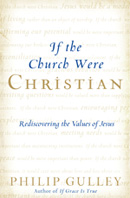 As I stated in an earlier blog post, the juxtaposition of reading Philip Gulley's book If the Church Were Christian
As I stated in an earlier blog post, the juxtaposition of reading Philip Gulley's book If the Church Were Christian while attending Trinity Institute's "Building an Ethical Economy" really intrigued me. I decided to e-mail this Indiana-based Quaker minister to see if he could illuminate some of the points he raised in his book.
Why do you say if Jesus intended to create a church he did a questionable job?
Author Marcus Borg used the words "movement initiator" to describe Jesus. While I do believe the charisma, compassion, and commitment of Jesus inspired a wide variety of people (and clearly infuriated and frightened others), I don't believe what he did was an attempt to initiate any new institution. Clearly, that was Paul's vision, and while Jesus might have initiated that movement, Paul brought it to fruition in a practical way. Indeed, I would go so far as to say Jesus seemed leery of religious institutions, and probably suspected any institution he might begin would inevitably fall prey to the very divisions and abuses he had witnessed in others. People interested in creating new institutions devote their time to funding, amassing power, building and organizing a base, then expanding it. If those were priorities for Jesus, he failed to articulate them and was unsuccessful in achieving them. Paul, however, did all those things and more.
How would you respond to those who claim Jesus was an anarchist sent to create an insurrection and overthrow the established order?
It's very tempting to read our own priorities and values into the life of Jesus. I do it myself. Those persons who are victimized by the established order, and there are many, might especially feel a kinship with a Jesus who defied and rebuked the tyranny of institutional power. I think the priorities of Jesus were to live out the values of God, as he understood them, as radically and faithfully as he could. That desire would naturally compel him to speak out against all tyranny, whether it was political, personal, religious, or cultural. I suspect Jesus had a bit of the anarchist in him, but I don't think that's all he was, or even who he primarily was.
How do you account for the power struggles that exist even in peace churches like the Quakers?
It has been my experience that most power struggles have at their base self-absorption and advancement. When I have been embroiled in power struggles, it has often been a consequence of my tendency toward self-promotion and my desire for status, though I try to cloak my motives in the garments of justice and equality. I suspect my struggle, and my failings, are universal ones.
What's your reaction when people declare that denominations are dead?
My first reaction is laughter. As one whose degree work is in the sociology of religion, I believe even the movements away from denominationalism will one day evolve into denominations. It is the natural order of religious bodies. Cults begin as a reaction against the established order. Then, in order to become socially accepted, cults become sects. Sects, in a further effort to become widespread, evolve into denominations. The names might well change, but our tendency to organize toward societal acceptance and respectability is always with us. So while a specific denomination might well die, our tendency toward denominationalism will not. We'll just have different names.
What do you see as the central task for the church of the future?
To teach us what it means to be loving and complete human beings.
 Becky Garrison will be speaking at "The Evolving Church: Kingdom Economy" in Toronto on April 10, 2010.
Becky Garrison will be speaking at "The Evolving Church: Kingdom Economy" in Toronto on April 10, 2010.
Got something to say about what you're reading? We value your feedback!